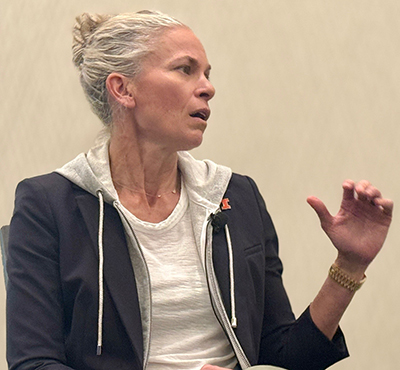Feb 4, 2025
Gies Business charting course through AI’s “Wild West” in business education

LAS VEGAS, Nev. – The rapid advancement of artificial intelligence (AI) is transforming industries across the globe, and business education is no exception. W. Brooke Elliott, the Josef and Margot Lakonishok Professor in Business and Dean of Gies College of Business recently shared her perspective on navigating this dynamic landscape at the 2025 AACSB Deans Conference. In a presentation to fellow business deans, Elliott emphasized innovation, collaboration, and a focus on core educational values. She acknowledged the sometimes chaotic nature of AI integration, agreeing with moderator and Eduvantis President Tim Westerbeck’s description of it as a "wild west" where experimentation and adaptation are paramount.
Gies College of Business boasts a long history of embracing technological change that dates back more than one 100 hundred years. This history of innovation, Elliott explained, is a key asset in navigating the current wave of AI disruption.
"We've really built an organization that's not only open to change but also embraces change and innovation,” Elliott said, highlighting the College’s ability to respond quickly to emerging trends. “We're always talking about what is next. And so it's really about bringing together the people, building out an organizational structure that allows you to thrive, and really embracing whatever the next innovation is."
Central to Gies' approach is a "faculty-first" philosophy. Recognizing that professors are at the heart of the learning experience, Elliott stressed the importance of equipping faculty with the knowledge and tools they need to effectively integrate AI into their teaching.
"It's always faculty first," she said. "We've spent a lot of time over the last couple of years really ensuring that faculty understand the implications of AI for business education." This includes providing training, workshops, and opportunities for faculty to experiment with AI tools in their classrooms.
Beyond individual faculty development, Elliott emphasized the need for interdisciplinary collaboration. Bringing together faculty with expertise in different areas and staff who possess technical AI skills is crucial for developing innovative and effective AI-driven educational programs.
"This is really a faculty-staff partnership," Elliott said, "That has been something that's been really interesting. And trying to think about, how do you build interdisciplinary teams where this staff member, a lot of times, has the expertise in the AI tool and getting faculty and staff to work truly as partners?" This collaborative approach, she believes, is essential for unlocking the full potential of AI in education.
While AI offers exciting new possibilities, Elliott cautioned against losing sight of the fundamental skills that business students need to succeed. She emphasized the importance of analytical reasoning, critical thinking, and communication, even as the technical skills required in the workplace evolve.
"Fundamentally, the skills that we want our learners to walk away with don't change," she said. "Do they need to walk away with a different technical skill set? Yes, of course. But again, that's ever evolving." The challenge, she explained, is to balance the development of these core skills with the integration of new technologies.
Looking ahead, Elliott articulated several key metrics for success in the age of AI. These include expanding access to education globally, improving operational efficiency, and enhancing the learner experience.
"If we haven't expanded access significantly to education using AI, we're doing something wrong," she said. She also highlighted the potential of AI to personalize learning, citing the example of her digital avatar that could act as a 24/7 teaching assistant. "We're not far from that," she predicted.
Elliott also addressed the challenge of ensuring equitable access to AI-enhanced education. She acknowledged that some institutions have more resources than others, and she stressed the importance of sharing knowledge and best practices to level the playing field.
"It's really about trying to create forums and build relationships so that we can share lessons learned," Elliott said, calling for greater collaboration and open communication within the educational community.
By working together, educators can harness the power of AI to create a more accessible, effective, and engaging learning experience for all students. This spirit of collaboration, she believes, is essential for navigating the "Wild West" of AI in business education and ensuring that all institutions can benefit from its transformative potential.
